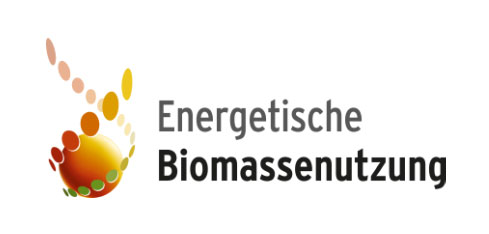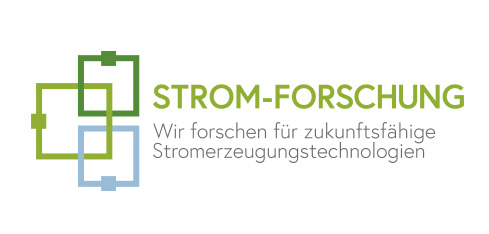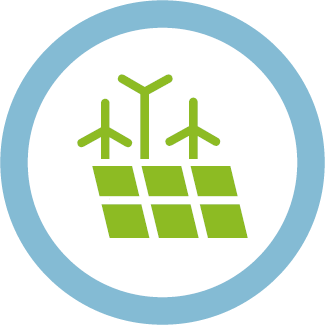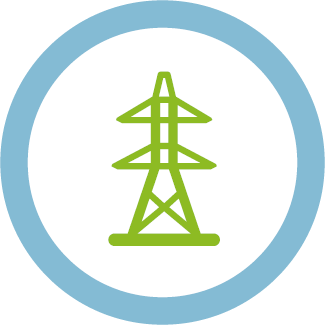Bioenergy Research Network

How can bioenergy be used as a cornerstone of the energy transition within our future energy system? This is the subject of discussion among the members of the Bioenergy research network. In close collaboration with supporting research projects, the members develop recommendations for action on bioenergy for the electricity market, heating market, and transport sector.
The focus of the Bioenergy research network is on using biomass from biogenic residues and waste, such as biowaste or green waste, for energy. Solid residues can be incinerated on a large scale in biomass heating and power stations and converted into electricity with steam turbines. Biogas can be converted into green energy using gas turbines. In the electricity, heating, cooling, and mobility sectors, bioenergy is already contributing to a climate-smart energy supply today. Over half of the renewable energy produced in Germany comes from bioenergy (as of 2018).
Bioenergy supports development of sector coupling
In order to allow bioenergy to be flexibly integrated into an increasingly complex energy system, its generation must be made more efficient, environmentally friendly, and economical. This requires innovative technologies, intelligent control instruments, and business models to match. In the future energy system, bioenergy will support the development of sector coupling and its strengths will be used both in the transport sector and as bioheat in the heating market. The four working groups in the Bioenergy research network work to address these challenges associated with the energy transition.
Continuous discussions and a constructive sharing of experience between the fields of research, industry, and politics within the network are valuable tools in ensuring strong practical relevance and a rapid transfer of research results to real-life applications. With the Bioenergy research network, the German Federal Ministry for Economic Affairs and Energy (BMWi) has initiated a platform that supports the dialogue process within this research field and brings together all the major players.
The transformation of our heating systems is an important area of the overall energy transition, for example in reference to carbon-neutral building stock. Bioenergy plants for heating, cooling, or both heating and power are already making an important contribution to this transformation today. Further research and development are needed to improve these systems’ cost effectiveness, make them more efficient, and reduce the emissions they produce. With respect to the related technologies, scientists are working on innovations involving, for example, combustion, gasification, or combined heat and power. In order to bring new systems and components to the market, cost-efficient solutions are needed, and technical, socioeconomic, political, and legal requirements (e.g. heating networks, efficiency, the German Renewable Energies Heat Act (EEWärmeG), or German federal immission control ordinances (BImSchV)) also have to be met. The challenges in this area are tackled in the working group covering bioenergy in the heating market. Furthermore, its members draw up statement papers for the areas of politics, science, and industry about the use of bioenergy in the heating market.
Contact
Dr. Volker Lenz
E-Mail: volker.lenz@dbfz.de
Website: German Biomass Research Center (DBFZ)
This working group addresses issues around the integration of bioenergy into the electricity market. Bioenergy could in future be a cornerstone of flexible electricity supply and storage in the energy system, providing system services and helping to maintain stability in the power grid. The conditions for this include research and development into systems, components, and strategies, in order to overcome the challenges involved in a successful market launch. This will require cost-efficient approaches, but technical, socioeconomic, political, and legal requirements (electricity market, power grids, efficiency, the Renewable Energy Sources Act (EEG 3.0)) also have to be met. On top of that, there are a number of issues surrounding the integration of bioenergy into the system. With respect to flexible bioenergy use, innovations and further development of components are the focus of this field of research.
Contact
Martin Dotzauer
E-Mail: martin.dotzauer@dbfz.de
Website: German Biomass Research Center (DBFZ)
Uniform standardization is required to successfully integrate bioenergy plants into the overall system, including standards for solid fuels, components, emissions, and sustainability. However, certification issues also have to be addressed. Scientists are also working on further developing methods of scientific analysis, calculation, and evaluation. These methods have to reflect and take into consideration current political and legal concerns (e.g. flexibility and energy security). Along with the transfer of research results on a national level, international exchange is also coming into greater focus. Currently this takes place through organizations such as the International Energy Agency (IEA). The working group on standardization hopes to include international experts in its discussions. Another focus is the demand for harmonized methodological approaches, which is also relevant in the other working groups.
Contact
Biogas:
Dr. Peter Kornatz
E-Mail: peter.kornatz@dbfz.de
Website: German Biomass Research Center (DBFZ)
Particulate matter:
Prof. Dr. Ingo Hartmann
E-Mail: ingo.hartmann@dbfz.de
Website: German Biomass Research Center (DBFZ)
In future, biofuels will make a significant contribution to the energy transition in transport, making it possible to achieve the climate goals in this sector and to appreciably reduce CO2 emissions. Bioenergy plants play an important role in this, particularly in relation to sector coupling between the electricity, heating, and mobility sectors. This poses questions surrounding the integration of these plants into the system. Another field of research is the development of fuels from residues and waste. What’s more, solutions combining electricity-based and biomass-based fuels must be researched. Scientists are also working on cost-efficient and low-emission fuel substitutes for applications where electromobility does not come into play. The members of the working group on bioenergy & mobility discuss the future need for research in line with the market potential of the various approaches and solutions, as well as the energy supply needs associated with the energy transition.
Contact
Jörg Schröder
E-Mail: joerg.schroeder@dbfz.de
Website: German Biomass Research Center (DBFZ)
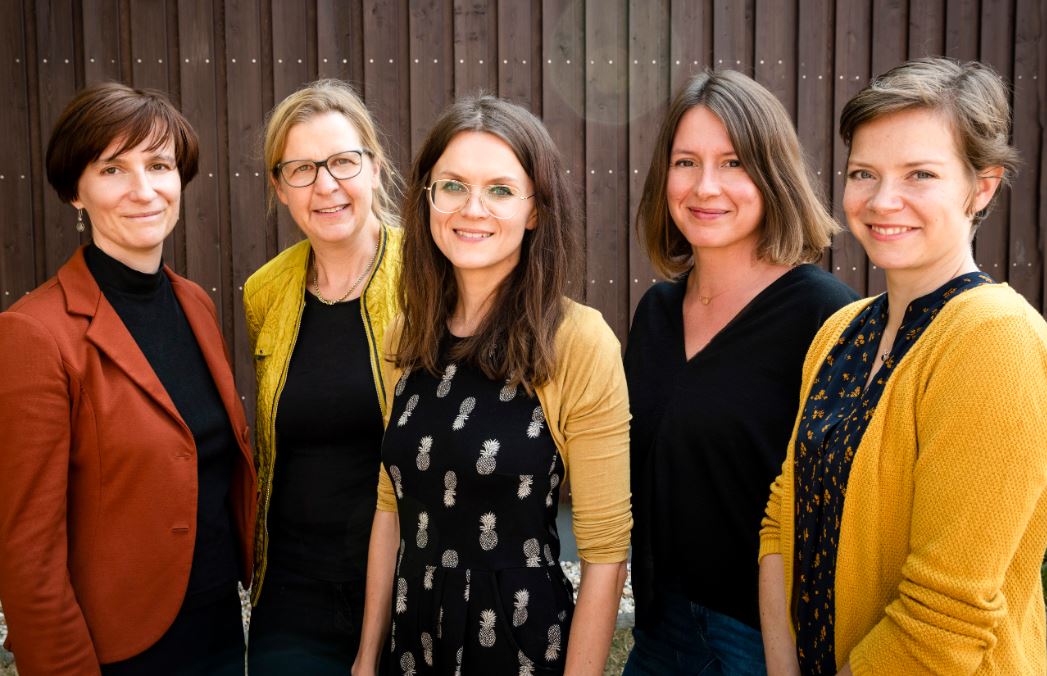
Bioenergy support team
The support team at the German Biomass Research Center (DBFZ) has been providing scientific and media support to the “Biomass energy use” funding programme since 2009, and to the Bioenergy research network since 2016. The support team simultaneously acts as an interface between the bioenergy network and key players from the fields of science, industry, sector-specific policy, and media.
Its overarching goal is to add value beyond the level of individual projects in the areas of networking, supporting research, and knowledge transfer. To do this, the members of the support team offer combined expertise in terms of scientific output and different points of view, and also supports professional dialogue within the network. That is how the support team coordinated the drafting of recommendations for the network’s future research agenda, for example. Furthermore, the team produces joint statements on current issues relating to (funding) policy.
The support team’s various tasks include managing a comprehensive internet platform for the funding programme, as well as specialist publications, media and public relations, workshops devoted to specialist subjects, and regular “status conferences”. Their own published series presents the projects’ and working groups’ results. So far over 20 volumes of the series and six “Focus On” magazines have been released, dealing with priority topics that include biogas, solid fuels, hydrothermal processes, and bioenergy technologies.
The support team also coordinates and organizes the network’s cross-project working groups with regard to the political discourse and the harmonization of methods. In concrete terms, the supporting research projects have already published collections of measurement methods relating to biogas, particulate matter, and gasification as well as a method handbook in German and English based on intensive discussions with the network partners.
- Energy Research Networks
- Bioenergy Research Network
- Energy Transition Construction Research Network
- Energy Transition and Society Research Network
- Renewable Energy Research Network
- Industry and Commerce Research Network
- Power Grids Research Network
- System Analysis Research Network
- Hydrogen Research Network


